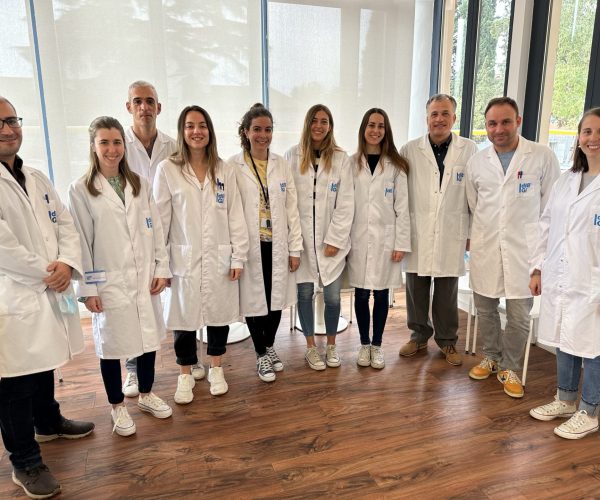An IDIBGI study discovers a link between fat and cognitive function of the brain
- The article, published in the journal Science Advances, identifies several genes that regulate brain cognition depending on how they are expressed in fat tissue, a previously unknown association.
- The work is led by Dr. José Manuel Fernández-Real and Dr. Jordi Mayneris-Perxachs, researchers at the Girona Biomedical Research Institute and CIBERObn.
A study by the Girona Biomedical Research Institute (IDIBGI) has found that there is a relationship between fat tissue and brain cognitive function. The article, published in the scientific journal Science Advances, identifies a group of genes that, depending on how they are expressed in adipose tissue, are associated with cognitive capacity. This is a hitherto unknown connection that may open the door to finding ways to improve these brain functions in the future.
The expression of a gene refers to the way in which the genetic information contained in the gene is translated in the body into a specific biological function. This study has focused on a dozen genes that are differentially expressed according to cognitive function, including abilities such as memory and learning.
The work has been published in the scientific journal Science Advances and has been led by Dr. José Manuel Fernández-Real, head of the Nutrition, Eumetabolism and Health research group of IDIBGI and CIBERObn, head of the Endocrinology section of the Dr. Josep Trueta Hospital of Girona and professor at the University of Girona, and Dr. Jordi Mayneris-Perxachs, Miguel Servet researcher of the same research group of IDIBGI. First authors are researchers Núria Oliveras, Dr. Anna Castells-Nobau and Lisset de la Vega, from the same IDIBGI group.
“These first findings are a relevant step to investigate how exactly this association works and thus be able to define the cause-effect relationships in a more concrete way”, says Dr. Fernández-Real, who adds: “The results of the study could open the door, in the future, to find new therapeutic ways to improve brain cognitive function by modifying gene expression in fat tissue”. This line of research may also be of interest in the search for specific treatments to address the cognitive impairment associated with obesity.
This research has its starting point in previous studies by the same research group, which had detected a very clear relationship between the expression of some genes in fat tissue and recent memory. These results led them to wonder what was the possible relationship between these two facts. To investigate, the team carried out tests in about 80 people, together with studies in mice and flies, confirming that there was a similar association between the same genes in adipose tissue and cognition in all three models. “By studying whole genome expression in the adipose tissue of participants, we identified 188 adipose tissue genes associated with performance on 10 cognitive tests. What is interesting is that modifying the expression of some of these genes in the adipose tissue of both flies and mice improved their memory and learning ability,” notes Dr. Mayneris-Perxachs.
The relationship that has been found may have to do with the characteristics shared by these two tissues and the similar genetic programming in different tissues: “Apart from the fatty tissue itself, another very fatty tissue that we find in our body is precisely the brain. Therefore, it could seem that there are two fats that are in dialogue with each other,” Dr. Fernández-Real points out. In fact, the expression of the same genes in blood cells (leukocytes) was also associated with cognitive traits, indicating the relative uniformity in gene expression in cells of very varied origin, notes Dr. Mayneris-Perxachs.
The study was conducted in collaboration with the Pompeu Fabra University of Barcelona, the Hospital del Mar Medical Research Institute (IMIM), and the University of Barcelona.
Reference article: Oliveras-Cañellas N, Castells-Nobau A, de la Vega-Correa L, Latorre-Luque J, Motger-Albertí A, Arnoriaga-Rodriguez M, Garre-Olmo J, Zapata-Tona C, Coll-Martínez C, Ramió-Torrentà L, Moreno-Navarrete JM, Puig J, Villarroya F, Ramos R, Casadó-Anguera V, Martín-García E, Maldonado R, Mayneris-Perxachs J, Fernández-Real JM. Adipose tissue coregulates cognitive function. Sci Adv. 2023 Aug 11;9(32):eadg4017. PMID: 37566655; PMCID: PMC10421051.
DOI: https://doi.org/10.1126/sciadv.adg4017
About IDIBGI
IDIBGI is a biomedical research institute that is part of the CERCA system of the Generalitat de Catalunya, dedicated to translational, clinical and epidemiological research aimed at improving the health and care of people. The Institute is made up of 22 research groups that conduct research in six health areas: cardiovascular and respiratory, oncohematology, metabolism and inflammation, neurosciences, mental health and medical imaging. Currently, in addition to having its own research staff, the IDIBGI manages the research carried out by health professionals from the Dr. Josep Trueta and Santa Caterina Hospitals, the Catalan Health Institute (ICS) in Girona, the Institute of Health Care (IAS), the Catalan Institute of Oncology (ICO) in Girona, and the Institute of Diagnostic Imaging (IDI).




